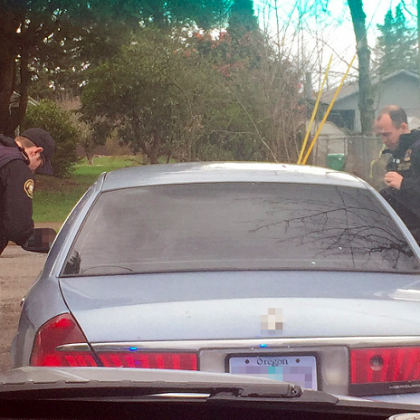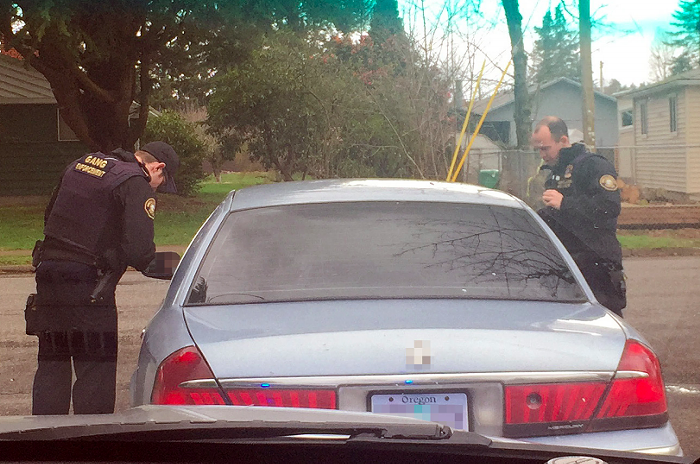Feature your business, services, products, events & news. Submit Website.
Breaking Top Featured Content:
What Will Oversight Look Like For PPB’s New Gun Violence Team?


It’s been more than a year since Portland City Council voted to disband the Gun Violence Prevention Team (GVRT), a police unit focused on deterring gun crimes, citing the team’s record of disproportionately pulling over Black drivers.
Now, as Portland Police Bureau (PPB) attempts to build a new 12-officer team dedicated to gun violence, its leaders are hesitant to admit that the previous iteration did anything incorrect, let alone racially biased. That’s left the team, dubbed the Focused Intervention Team (FIT), wary to open the door to a new volunteer committee formed to oversee the new team’s work. Instead of keeping tabs on the racial disparities within their work, PPB leaders hope this new group will act as a buffer between their police work—which officers admit will focus on Black Portlanders—and the public’s criticism.
The FIT was announced by Mayor Ted Wheeler in March, after Portland saw a record year for fatal gun violence. Yet Wheeler promised the FIT wouldn’t bring the same problems observed within the GVRT, because it would come with a “stakeholder group” responsible for overseeing the new team’s impacts on communities of color and data analysis.
That oversight committee, called the FIT Community Oversight Group (or “FIT COG”), is made up of community members appointed by City Council and has been meeting weekly since June. Meetings have mostly centered on establishing the duties and roles of the FIT COG, as well as other administrative decisions (like the possibility of changing its clunky name).
While the FIT has still yet to be fully staffed, PPB has identified some of its internal leadership, several of whom have regularly attended the FIT COG meetings. One of those leaders is Ken Duilio, a PPB officer formally assigned to the bureau’s GVRT. Duilio will serve as a sergeant leading the FIT.
During an August 12 meeting of the FIT COG, Duilio told its members what role he’d like them to play.
“When we were GVRT, there was a ton of things we did right,” Duilio said. But, he added, the public only seemed to notice negative things, like the 2018 audit that showed GVRT officers were predominantly pulling over Black drivers for minor traffic violations, based on suspicions that those drivers were involved in gun-related activities. The data found that 59 percent of drivers stopped by the gun team were Black, while Black people make up just under 6 percent of Portland’s population.
“But… for a lot of the things we did right… either we didn’t do as good a job of putting it out there, or we didn’t have the people in the community or like, an oversight group, that could defend us or explain things,” Duilio said.
“One of the examples is the [traffic] stops data,” he continued. “You can’t just put out the information from the stops data and say, ‘The police bureau overly stopped minority members for the wrong reason, that was racist, that was disparate.’ You just can’t do that without having the other context to it. That is one area where I see the FIT COG helping the police bureau be more effective in doing this kind of work going forward.”
Duilio didn’t clarify what kind of context was missing from the audit’s data on traffic stops but, in the past, the bureau has pointed to the fact that victims of gun violence in Portland are disproportionately Black to explain the perception of racist policing. Data recently compiled by Willamette Week found that 41 percent of Portlanders killed by a gun in the past year were Black.
Not everyone on the FIT COG appeared eager to serve in the role suggested by Duilio. Jaidra Hennessey, who works as an advocate for domestic violence survivors at YWCA of Greater Portland, questioned the amount of access the FIT COG would have to internal documents and data.
“I want to make sure we’re not just a team whose purpose is PR and publicity and selling something without actual oversight,” said Hennessey.
Later in the meeting, Duilio said the FIT team doesn’t want anything that the group isn’t comfortable with. “But, at the same time,” he said, “it’s incumbent that you are fully educated on the past, the audit, and the plan moving forward.”
Duilio and others appointed to lead the FIT are still hashing out what that plan will look like—and who will carry it out. In previous FIT COG sessions, PPB staff explained that the very existence of an oversight group has many officers wary to join the new gun violence team.
“I’ll just be real,” said Officer Deanna Wesson-Mitchell at an August 5 FIT COG meeting. “Honestly, there is concern that, if there are too many Black people arrested, that this group will throw police officers under the bus.”
“We have a disproportionate number of Black people in our community involved in gun violence,” she continued. “And there’s probably going to be a disproportionate amount of Black people that are contacted by this group. That’s the result of systemic racism… in economic, educational, housing… in all these different factors that lead people to choose gun violence to solve problems.”
Wesson-Mitchell, who collected feedback from PPB officers on why they didn’t want to be part of the FIT, said that officers question whether the FIT COG will be considering those systemic issues that lead to gun violence.
“Will this group be honest about race?” said Wesson-Mitchell, who is Black. “That’s one of the concerns: Will this group be honest about race?”
FIT COG member Lakayana Drury, director of Word is Bond, acknowledged her comments later in the meeting.
“Yes, the Black community here is disproportionately impacted by gun violence,” said Drury. “So, for me personally, I’m not alarmed if our stops are targeted in those areas, per se. As long as they are yielding results that are proportionate.”
To Drury, that would look like FIT officers actually recovering firearms from the people they stop, proving that they are actually involved in gun activity. The 2018 GVRT audit found that only 2 percent of traffic stops conducted by PPB’s gun team ended with an officer actually finding a gun in that person’s car.
The August 12 FIT COG meeting was the first that allowed the oversight group to be privy to confidential details about the week’s shootings—a portion of the meetings that the public are excluded from. FIT COG members must sign non-disclosure forms to attend this section of the meeting. According to Sam Adams, the staffer in Wheeler’s office tasked with orchestrating the new oversight group, Portland appears to be the only city that has a police oversight group that’s allowed access to this information.
“It’s an opportunity for the police bureau to provide details about their work in a real-time basis and include in that reporting the known race of those involved,” Adams said. “My hope is that we’ll get really good feedback and questions… it will take time for people to develop the rhythm of this, the knowledge of this.”
Adams, who previously served as Portland’s mayor, told FIT COG members he’s been involved in helping structure at least two different gun violence groups within PPB (the GVRT and its predecessor, the Gang Enforcement Team [GET]).
“The reason that these groups in the past have… gone away is because they’ve lost the trust, not just of decision-markers, but of a significant portion of the community,” said Adams.
“I don’t want, six months from now, for this newest effort to be called out for being racist,” he added. “We want to make sure there’s support.”
Continue Reading at PortlandMercury.com here
